Donald Trump's influence on global politics remains a significant topic of discussion, even outside of his presidency. From foreign aid suspensions impacting refugees to proposed transformations of war-torn regions, his policies continue to spark international concerns.
Foreign Aid and its Impact
The impact of Trump's decisions on foreign aid is particularly concerning. Along the Thai-Myanmar border, the suspension of USAID funding has had devastating consequences. Despite promises that life-saving assistance would be exempt, countless groups providing critical care have been forced to cease operations. This has left vulnerable populations, like refugees from Myanmar, without essential resources. Wah K’Ler Paw, a 30-year-old refugee, tragically died after going without dialysis for two weeks. Her husband, Thaw, recounts her suffering in the Mae La refugee camp, highlighting the human cost of these policy changes.

This situation underscores the delicate balance between foreign policy decisions and their direct impact on human lives. The ripple effects of such policies are far-reaching, affecting not only individuals but also the stability and well-being of entire communities.
Controversial Plans for Gaza
Trump's vision for a transformed Gaza has also drawn significant attention and criticism. A video shared by the former president depicts a touristic Gaza, featuring scenes of extravagance such as Elon Musk throwing cash in the air, a hotel from his chain, and a gold statue of himself prominently displayed on the street. This vision, dubbed "Trump Gaza Number 1," has been met with skepticism and concern, particularly given the current state of the region, devastated by conflict.

Critics argue that such a plan is insensitive to the suffering of the Palestinian people and unrealistic given the complex political and humanitarian challenges in the region. The proposal has been widely interpreted as a self-promotional stunt, further fueling concerns about Trump's approach to international relations.
International Relations and Future Prospects
The potential return of Trump to the political stage is prompting various nations to adjust their strategies. The British government, for example, has announced plans to increase its defense budget to 2.5% of GDP by 2027, with the funding coming from cuts in development aid. This decision, announced by Prime Minister Keit Starmer ahead of a meeting with Trump, suggests a strategic shift in anticipation of a potentially more assertive American foreign policy.

Furthermore, Trump's past actions, such as the "Gulf of America" debacle, continue to raise concerns about potential authoritarian tendencies. The Associated Press's lawsuit against the White House for violating free press rights highlights the importance of safeguarding democratic principles and resisting attempts to stifle dissent. As one article notes, allowing retaliation against the press would create "Kremlin-like conditions" that would affect all Americans. The Czech Minister of Foreign Affairs, Lipavský, also warns that international relations can be harsh and that Putin does not even want to hear about peace.
These various events collectively paint a picture of a world grappling with the potential resurgence of Trump's policies and their implications for global stability, human rights, and international cooperation.
